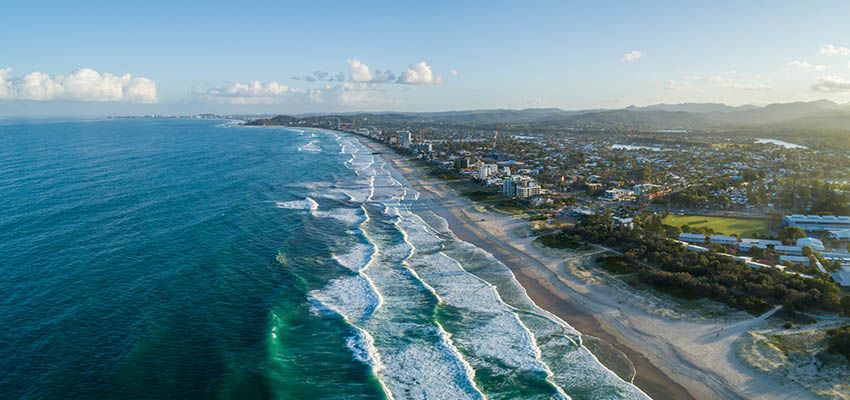Queensland’s market is not going in the same downward direction as its southern cousins anytime soon, according to the Real Estate Institute of Queensland (REIQ).
Data from the state’s real estate body showed the Sunshine State continued to record solid property price growth in the March 2022 quarter, a stark contrast with the sombre situation unfolding across the southern states.
Median house prices and unit prices rose by 3.23 per cent and 2.17 per cent, respectively, during the first three months of the year, according to figures released by REIQ.
The quarterly gains brought the average sale price for houses and units to stand at a quarterly median price of $640,000 and $470,000, respectively.
On an annual basis, the average price for houses in Queensland is up by 15.27 per cent, while units rose by 11.11 per cent. Currently, median prices for houses stand at $592,500, while average unit prices are at $450,000.
Noosa was followed by Logan with a 7.75 per cent quarterly increase to $598,000, followed by Toowoomba (up 6.67 per cent to $480,00), Gladstone (up 6.58 per cent to $405,000), and Ipswich (up 6.38 per cent to $500,000 ) to round out the top five major LGAs with the biggest jumps in average prices during the period.
Moving on to the unit sector, the top five growth performers during the quarter were Gladstone (up 18.37 per cent to a median price of $290,000), Fraser Coast (up 16.18 per cent to $395,000), Logan (up 10.91 per cent to $305,000), Sunshine Coast (up 7.21 per cent to $646,000), and Moreton Bay (up 6.05 per cent to $403,000).
Commenting on the figures, REIQ chief executive Antonia Mercorella said that the state’s growth would not end in the latest quarter, stating that Queensland is currently positioned for further growth.
“Over the past two years, the story of Queensland’s property market has been an extraordinarily positive one from a seller’s perspective, and the latest quarterly data tells us the Sunshine State market is still a rising star,” Ms Mercorella said.
She acknowledged that the strong quarterly gains did not come without obstacles, noting the several headwinds that the market faced from January to March. She also noted that the year also has more challenges up its sleeve for the region.
“The first quarter of 2022 has been fraught with disruptions such as COVID-19 outbreaks, the flooding disaster, the string of long weekends including the standstill of Easter, the looming federal election, and signs pointing to an interest rate rise, with some banks adjusting early in anticipation,” she said.
And while these disruptive events have caused some buyers to “hit pause” on their property hunting in Queensland, Ms Mercorella said that the state has sustained its healthy growth, adding: “I’m sure the median prices reached this quarter will take some of us by surprise.”
She also highlighted that it’s not just the state’s capital city that is delivering strong growth: “Our regional centre property markets and communities also continue to benefit from a growth uplift.”
For buyers who are deterred by the rising prices in the region, Ms Mercorella offered some advice.
“Of course, it can be easy to be disillusioned and discouraged as a buyer watching these prices reach new heights, but it’s important to remember these are median sales figures over a relatively short period of time and there are always more affordable options in areas with a million-dollar median – so it’s worth doing your research before assuming an area or suburb is out of your reach,” she said.
For those looking for a bargain, the quarterly median house price remained under half a million dollars in Ipswich ($500,000), as well as in regional centres such as Rockhampton ($330,000), Townsville ($390,000), Bundaberg ($400,000), Gladstone ($405,000), Mackay ($425,000), and Toowoomba ($480,000).
Where to next for Queensland’s property market?
Ms Mercorella said that while “crystal ball” predictions of where Queensland’s property market is headed are generally prevalent, they are not definitive forecasts.
“Our state still has all the fundamental ingredients for continued growth – a booming population, very low supply, strong and cashed-up buyer demand, relative affordability and low interest rates,” she said.
The REIQ executive also touched on the potential ripple effect of the Reserve Bank’s monetary policy decisions in the coming months.
“So even as we face more interest rate rises, we expect this will take time to noticeably impact buyer’s pockets and sales prices, and in the meantime, the clear supply shortage will continue to tip the scales in favour of sellers, as buyers compete to secure a property,” Ms Mercorella said.
“We expect there will also be buyers who have been waiting in the wings, who may decide that now is the right time to swoop while they can still secure low fixed rates. Certainly, with how incredibly tight the rental market is, transitioning to ownership would be increasingly appealing to renters.”
Ms Mercorella also admitted that the strong gains would eventually level off, but reiterated that it will still take some time before the market cools.
“We recognise that at some stage the rate of growth we see in Queensland will start to level and stabilise, simply because it would be difficult to sustain this level of accelerated growth – but for now, there’s still plenty of wind in the sails of Queensland’s property market,” she stated.





